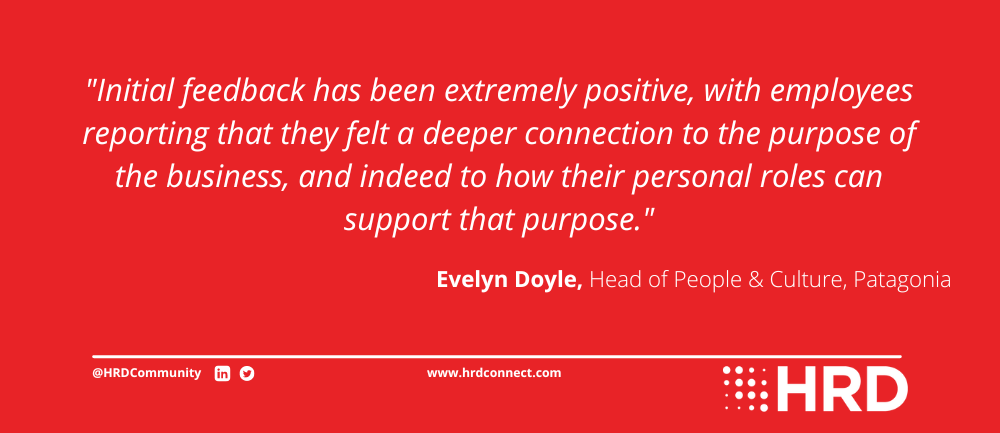-
Provided by

- Date published: Dec 7, 2022
- Categories
California-based outdoor apparel company Patagonia regularly tops league tables for its brand and reputation. For instance, in 2021 the Axios Harris Poll 100 rated the company the most reputable in the United States. The league table was constructed according to factors such as ethics, culture, and affinity.
In many ways, this should come as no surprise, as the Patagonia brand is unique in the corporate world. For instance, they donate millions of dollars each year to environmental causes and regularly strive to do the right thing for the planet, even if it imposes short-term costs on the business. For instance, they notably removed third-party logos from their garments to try and encourage them to be passed on rather than thrown out when no longer wanted.
This is a company whose purpose is not so much to make money but rather to “…use business to inspire and implement solutions to the environmental crisis.” It’s perhaps no surprise that founder Yvon Chouinard’s 2012 book was titled The Responsible Company, co-written with Vincent Stanley who is the director of philosophy for the company. For Evelyn Doyle, the Head of People & Culture, International, at the company, it was a marked change from the previous organisations she had worked at.
“I was really going through my own journey of unlearning, as everything I had learned in my previous roles in terms of a purer focus on financial return of investment only was no longer really relevant,” she explains. “I actually had to step back to realise that what really mattered to Patagonia was the ability to experiment and grow whilst making mistakes along the way and ensuring that people, planet, and profit could all work together to do good business.”
_______________
Finding meaning
With such a distinctive culture, it was also clear that providing support to the company’s community would need to be as radical and as innovative as the company itself. This is especially so as the Patagonia employee community is incredibly passionate about nature and the environment, it’s crucial that we’re able to find ways to align those individual passions with the purpose of the company – alongside the usual core sports activities that many of our people come to the company and brand for.

As such, Earth University was created to try and help employees not just understand the purpose of the business but also both absorb it fully and understand how they can engage in saving our home planet, in their own way, in their own role – whatever that role was in the organisation as well as learning new skills to apply to their personal lives, aside from work.
This was important as the project was not designed only for senior leaders to participate in. It was truly something for everyone at all levels of the organisation and working across teams and experience levels was actively encouraged. The project was also deliberately referred to as a university because core to its philosophy was a sense of coming together to debate the kind of big questions the company asks every day, such as what it means to grow responsibly and how can it act for and on behalf of the planet.
The company engaged a trusted partner to help and support us in setting up Earth University; Andres Roberts, founder of The Bio-Leadership Project and Way of Nature, both of which aim to help people, teams, and organisations go into nature.

_______________
A holistic curriculum
The Earth University Programme is run over the course of a year and is open to all employees. The programme consists of four modules, each of which takes three days and is completed in nature. Employees take one module per quarter.
- Growth – The first model aims to challenge the conventional growth narratives that employees are familiar with, while also helping them to explore possible alternative narratives, both on a personal and organisational level.
- Community – The second module builds on this and encourages participants to develop their sense of connection, mutual support, and allyship with not only their colleagues within Patagonia but also with stakeholders outside the company.
- Navigation – The third module offers employees the opportunity to explore the various organisational dynamics that make Patagonia different. Through this, the aim is to help them to redefine the nature of their work and to navigate the operational complexities that are so prevalent today.
- Revolutions – The final module takes a systems-based approach and helps participants to understand the dynamics behind systemic change. This module also aims to develop an understanding of Patagonia’s role in society and how it can be a force for good in a number of different ways.
The project was co-designed with input from across the employee community, with employees also given the opportunity to become Learning Ambassadors for particular modules. This gave them the opportunity to not only be part of the facilitation itself but also help to lead and coordinate the modules during each course day. This provided invaluable new experiences to many employees.
_______________
Adult forest school
Forest schools are increasingly popular concepts that allow children to develop within a natural environment in a distinctly hands-on manner, and Earth University is run along very similar lines. The culture at Patagonia is not one that’s purely driven by ROI, so the project is not a linear one in which you put in particular inputs and expect certain outputs at the end. It’s far more complex than that and aims to provide an environment in which employees can ask questions and generally explore where it takes them, in as fluid and organic a way as possible.
The programme began in 2019 and, after a well-received first year, Covid struck and the lockdown periods that were commonplace throughout 2020 and 2021 meant that the school was postponed for two years. The principles behind Earth University remained, however, and the company doubled down on its leadership to be there for employees in whatever way it could. While much of this support was delivered online, the company tried to meet in person whenever possible.
Despite this forced pause in the programme, the initial feedback has been extremely positive, with employees reporting that they felt a deeper connection to the purpose of the business, and indeed to how their personal roles can support that purpose. They also revealed that they’d developed new relationships with their colleagues and generally felt more inspired about working for Patagonia. It also provided these new perspectives and cross-functionality engagement to the entire EMEA team.
The informal nature of the University also meant that hierarchy had no place during school time. This allowed junior employees to take on leadership roles and develop their skills in a safe space.

_______________
Maintaining the energy
The nature of the programme is that it only lasts for a few days, so it’s crucial that the company is able to sustain the energy that is developed during the course when people return to the workplace.
“We’ve invested a lot in ensuring that the real “fire in the belly” that we have for those three days together and bring that back into the day-to-day of the organisation,” Doyle explains.
One of the first steps was the creation of learning ambassadors and employee forum groups to help people work through the things that were covered in the forest. This was especially important as some of the sessions had proved to be very emotional for people.
“For our growth module, for example, we asked people to consider not only what growth meant for them as individuals or for this organisation but also how that growth might impact the planet,” Doyle continues. “They had to be prepared to be really vulnerable and show up in an authentic way, while also being okay with saying that they don’t have all the answers.”
Given the strong emphasis placed on culture at the organisation, it was also important that the external trainers brought into the university had a good cultural fit. These facilitators typically came from a wide stratum of society, including activism, academia, theatre, and business.
“Because the programme was pretty unique, we had to have facilitators who were happy doing things in a less traditional way,” Doyle explains. “A key lesson we learned during the first year was just how important it was to get this right so that the facilitators truly buy into what we’re trying to do.”
In a world that is not only changing rapidly but also sees employees demanding that their employer take a more active and positive role in making society better, projects like Earth University provide a benchmark for how organisations can go about this. While it alone is not what makes industry peers the company is a “great place to work”, it does undoubtedly do its part in developing and supporting our ‘’Going Purpose’’ culture that makes the organisation so attractive to prospective employees and our internal community.








